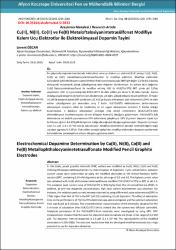Cu(II), Ni(II), Co(II) ve Fe(II) metaloftalosiyanintetrasülfonat modifiye kalem ucu elektrotlar ile elektrokimyasal dopamin tayini
Citation
Özcan, L. (2019). Cu(II), Ni(II), Co(II) ve Fe(II) Metaloftalosiyanintetrasülfonat Modifiye Kalem Ucu Elektrotlar ile Elektrokimyasal Dopamin Tayini . Afyon Kocatepe Üniversitesi Fen Ve Mühendislik Bilimleri Dergisi , 19 (2) , 291-300 . Retrieved from https://dergipark.org.tr/tr/pub/akufemubid/issue/48783/519233Abstract
Bu çalışmada dopamin tayinlerinde kullanılmak amacıyla kalem ucu elektrot (KUE) yüzeyi Cu(II), Ni(II), Co(II) ve Fe(II) metaloftalosiyanintetrasülfonatlar ile modifiye edilmiştir. Modifiye elektrotlar kullanılarak 0,50 mM dopamin içeren Britton-Robinson tamponunda (BRT) pH değeri 2,0 ile 9,0 arasında dönüşümlü voltametrik olarak yükseltgenme akım değerleri belirlenmiştir. En yüksek akım değerine Cu(II) ftalosiyanintetrasülfonat ile modifiye edilmiş KUE ile (KUE/CuFSTS) BRT içinde pH 2,0’de ulaşılmıştır. KUE ile kıyaslandığında KUE/CuFSTS ile elde edilen pik akımı % 30 daha fazladır. Ayrıca oldukça düşük dopamin derişimleri için pik akımında çok daha yüksek iyileşme tespit edilmiştir. Örneğin 10 µM’lık dopamin içeren BRT içinde (pH 2,0) KUE’ye kıyasla diferansiyel puls voltametrisi (DPV) ile elde edilen yükseltgenme pik akımındaki artış 7 kattır. KUE/CuFSTS elektrotlarının performansına adsorpsiyon süresinin etkisi de incelenmiş ve en uygun adsorpsiyon süresinin 5 dakika olduğu bulunmuştur. 5 dakikalık adsorpsiyon süresiyle elde edilen elektrotların (KUE/CuFSTS-5dk) elektrokimyasal karakterizasyonu akımın difüzyon kontrollü olduğunu göstermiştir. KUE/CuFSTS-5dk elektroduna ait analitik parametreler DPV kullanılarak çalışılmıştır. DPV ölçümleri dopamin tayini için belirlenen eğrinin 4,0-250 µM derişimleri aralığında doğrusal olduğunu göstermiştir. Dopamin için tayin sınırı 1,3 µM (1,3 x 10-6 M) olarak bulunmuştur. Modifiye elektrotların yeniden üretilebilirliğinin bağıl standart sapması % 4,25’dir. Elde edilen sonuçlar geliştirilen modifiye elektrodun dopamin tayinlerinde kullanılabilme potansiyelinin yüksek olduğunu göstermektedir. In this study, pencil graphite electrode (PGE) surface was modified by Cu(II), Ni(II), Co(II) and Fe(II) metallophthalocyaninetetrasulfonates for determination of dopamine. Cyclic voltammetric oxidation current values were determined by using the modified electrodes in the Britton-Robinson buffer solution (BRT) containing 0.50 mM dopamine at the pH range of 2.0 and 9.0. The highest current value was obtained with Cu(II) phthalocyaninetetrasulfonate modified PGE (PGE/CuFSTS) in BRT at pH 2.0. The oxidation peak current value of PGE/CuFSTS is 30% higher than that of unmodified one (PGE). In addition, at very low dopamine concentrations, high peak current improvement was observed. For instance, the oxidation peak current increase obtained by using differential pulse voltammetry (DPV) is 7 fold higher than that of PGE in the BRT (pH 2.0) containing 10 µM dopamine. The effect of adsorption time on the performance of PGE/CuFSTS electrodes was also investigated and the optimum adsorption time was found as 5 minutes. The electrochemical characterization of the electrodes obtained for the 5 minutes of adsorption time (KUE/CuFSTS-5min) showed that the current was diffusion controlled. Analytical parameters of the PGE/CuFSTS-5min electrode were investigated by using DPV. DPV measurements showed that the curve for dopamine determinations are linear in the range of 4.0-250 µM. The detection limit for dopamine is 1.3 µM (1.3 x 10-6 M). The reproducibility of the modified electrodes is 4.25% (RSD). The obtained results show that the developed modified electrode has a high potential to use for dopamine detection.



















